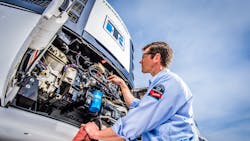Thermo King standardizes R-452A to decarbonize refrigerated fleets by almost 50%
Thermo King announced it will be first in the industry to transition to a lower global warming potential (GWP) refrigerant called R-452A as standard in its truck and trailer units by mid-2022, with new units no longer using R-404A. The transition begins this month. This will reduce the carbon footprint of refrigerants used by its customers’ long-haul, middle-mile and last-mile delivery fleets by nearly 50% or approximately 650,000 metric tons of CO2e annually, equivalent to the emissions of 143,000 passenger vehicles per year.
While customers previously had the option to drop in the lower global warming potential refrigerant, Thermo King units will now come standard with the industry’s most sustainable refrigerant available in the market today.
“Our company’s entire strategy is centered on sustainability, and we are committed to delivering innovative solutions to customers that create value for their operations and are better for the planet,” said Karin De Bondt, president, Thermo King Americas. “The enhancements to our trailer and truck units are important to decarbonizing the refrigerated fleets that deliver life-sustaining cargo, including foods and medicines, to people around the world.”
These actions contribute to parent company Trane Technologies’ Gigaton Challenge to reduce customer emissions by a billion metric tons by 2030.
In addition to helping customers meet their sustainability commitments, using a lower-GWP refrigerant as standard will help customers prepare for future regulation. Beginning in 2023, the California Air Resources Board (CARB) will require TRUs operating in California to use refrigerants with a GWP of 2200 or less. In North America, Thermo King is one full year ahead of this regulation.
As part of the global transition to more sustainable refrigerants, Thermo King has been using R-452A for its entire EMEA (Europe, Middle East, Africa) portfolio for several years and select products in North America and in Asia Pacific.
With its 2030 Sustainability Commitments, Trane Technologies noted it is helping solve for some of the world’s biggest sustainability challenges. These commitments include the Gigaton Challenge to reduce customer emissions by a billion metric tons by 2030.
